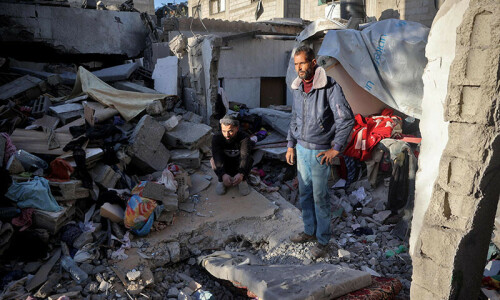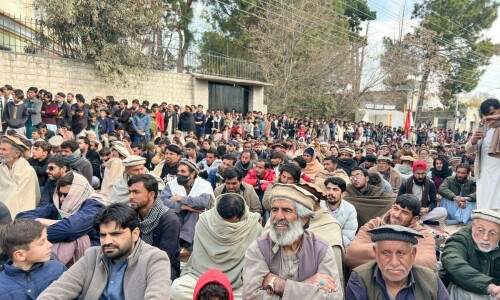
SANAA: Yemen's president warned on Tuesday that his country would descend into civil war if he is forced to quit and Washington voiced concern about instability in the Arabian state where al Qaeda has a stronghold.
Unrelenting anti-government protests, which first began on Feb. 3, and fresh defections among the ruling elite have added to the pressure on Saleh, a US ally against extremists, to step down immediately after 32 years in power.
But an aide said the president would leave office only after organising parliamentary polls by January 2012 and he refused to hand over power without knowing who would succeed him.
“President Ali Abdullah Saleh said he will hand over power through (parliamentary) elections and the formation of democratic institutions at the end of 2011 or January 2012,” Saleh's media secretary Ahmed al-Sufi told Reuters.
“Ali Abdullah Saleh does not seek power. Ali Abdullah Saleh will not leave without knowing who he is handing over to.”
US Defense Secretary Robert Gates voiced rare public alarm about the situation in Yemen: “We are obviously concerned about the instability in Yemen.” He added that he was mainly anxious to avoid “diversion of attention” from opposing al Qaeda there.
The opposition movement swiftly rejected Saleh's offer to stay until January 2012. The coming hours would be “decisive”, Mohammed al-Sabry, a key opposition spokesman, said.
In speeches to army officers and tribal leaders in Sanaa, Saleh said Yemen would face civil war and disintegration because of efforts to stage what he called a “coup” against his rule.
“You have an agenda to tear down the country, the country will be divided into three instead of two halfs. A southern part, northern part and a middle part. This is what is being sought by defectors against the unity,” he said, referring to northern Shia rebels and al Qaeda militants.
“Those who want to climb up to power through coups should know that this is out of the question. The homeland will not be stable, there will be a civil war, a bloody war. They should carefully consider this,” Saleh told army commanders.
SLIDE INTO FAILED STATE
Western countries fear the political crisis could hasten a slide into failed nation status for a country that borders the world's biggest oil exporter, Saudi Arabia, and major shipping routes. One scenario could see the country split into separate zones along tribal, military or regional lines.
Al Qaeda has already used Yemen to attempt attacks in Saudi Arabia and the United States in the past two years. The Shia Houthi movement has staged a number of revolts against Saleh.
One opposition leader offered Saleh the prospect of secure retirement if, like Egyptian President Hosni Mubarak, he would go quietly, unlike Libyan leader Muammar Qadhafi.
“He shouldn't follow the style of Qadhafi by destroying the country and killing people,” Yassin Noman, rotating head of Yemen's opposition coalition said.
“After this long term of governing, he should say: Thank you my people, I leave you peacefully.”
“I know the morality of Yemeni people. If he left peacefully, they will look at him as a real leader. He will be able to live wherever he likes,” Noman told Reuters. “They will ensure him a very nice life. His dignity will be kept.”
Several generals and officials have abandoned Saleh this week after a massacre of pro-democracy demonstrators on Friday, as one of the most violent of the uprisings that have swept the Arab world has pushed his administration to breaking point.
On Tuesday, Abdel-Malik Mansour, Yemen's envoy to the Arab League, told Al Arabiya television he was siding with protesters. Abdul-Rahman al-Iryani, whom Saleh sacked as environment minister on Sunday along with the rest of the cabinet, said on Facebook he was joining “the revolutionaries”.
PROTEST MASSACRE
Defections have included generals, tribal leaders, diplomats and ministers. They have gained momentum since gunmen loyal to Saleh opened fire on demonstrators in the capital Sanaa on Friday. Fifty-two people were killed.
A crowd of around 10,000 gathered outside Sanaa University in a rally that has been repeated for the past seven weeks.
Echoing demands that have been satisfied in Tunisia and Egypt and continue to be heard elsewhere across the region, they chanted: “The people want the fall of regime”.
The body of one of those killed on Friday was brought to the protesters before burial.
“The people want a trial for the butcher,” they shouted, hurling abuse at Saleh. France on Monday became the first Western power to call publicly for Saleh to stand down. Foreign Minister Alain Juppe described his departure as “unavoidable”.
Attention shifted to the United States and Saudi Arabia, two key allies who see Yemen as a bulwark against a dynamic al Qaeda network that has made skilful use of Yemen's poverty, tribal system and central government dysfunction to use the country as a staging ground for attacks against US.














































Dear visitor, the comments section is undergoing an overhaul and will return soon.